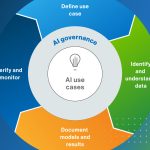This paper presents a structured framework to guide the ethical governance of Generative AI systems, acknowledging that GenAI’s creative capacity introduces risks and complexities not adequately addressed by traditional AI standards. Aboitiz Data Innovation (ADI) argues for a lifecycle-based approach that integrates ethical principles at every phase—from problem definition and … [Read more...] about Navigating GenAI Ethics: A Review of Its Regulatory Landscape and a Proposed Framework
Cybersecurity-Artificial Intelligence
Artificial Intelligence and Cybersecurity: Balancing Risks and Rewards
AI technologies offer significant business benefits but introduce unique cybersecurity challenges that organizations must address to innovate safely. A risk-based approach is essential, involving diverse stakeholders across legal, technology, HR, compliance, and business units. Creating an inventory of AI applications helps organizations track usage, mitigate risks of "shadow … [Read more...] about Artificial Intelligence and Cybersecurity: Balancing Risks and Rewards
AI Security: Risks, Frameworks, and Best Practices
AI security encompasses a range of measures designed to protect AI systems from unauthorized access, manipulation, and malicious attacks. These safeguards ensure the integrity, privacy, and proper functioning of AI applications, which are increasingly integral to modern operations. The risks extend beyond technical vulnerabilities to ethical concerns, such as bias and … [Read more...] about AI Security: Risks, Frameworks, and Best Practices
The Rise of Agentic AI: How Hyper-Automation is Reshaping Cybersecurity
Agentic AI is reshaping cybersecurity and the workforce, offering unprecedented efficiency by enabling systems to perform tasks autonomously. Unlike traditional automation, which relies on predefined workflows, agentic AI dynamically adapts and collaborates across domains, handling complex tasks such as incident remediation and threat hunting without constant human … [Read more...] about The Rise of Agentic AI: How Hyper-Automation is Reshaping Cybersecurity
CISA, JCDC, Government and Industry Partners Publish AI Cybersecurity Collaboration Playbook
The AI Cybersecurity Collaboration Playbook, released by the Cybersecurity and Infrastructure Security Agency (CISA) through the Joint Cyber Defense Collaborative (JCDC), offers critical guidance for managing cybersecurity risks in AI systems. Designed for AI providers, developers, and adopters, the playbook promotes voluntary sharing of actionable information related to AI … [Read more...] about CISA, JCDC, Government and Industry Partners Publish AI Cybersecurity Collaboration Playbook
Generative AI and IT Governance: Friends or Foes? Navigating the Future of Generative AI and Information Governance
Generative AI’s transformative potential will depend on how organizations integrate information governance into their operations. Governance frameworks will address risks like bias, data misuse, and regulatory challenges while ensuring compliance, ethical practices, and trust. Ethical AI will become a necessity, requiring audits for fairness, transparency protocols, and … [Read more...] about Generative AI and IT Governance: Friends or Foes? Navigating the Future of Generative AI and Information Governance
Why AI Falls Short in Regulatory Consulting
AI's rapid advancements have transformed industries through automation and data analysis, yet its application in regulatory consulting reveals significant shortcomings. Regulatory frameworks are complex, jurisdiction-specific, and often require nuanced interpretation that AI struggles to provide. While AI excels at basic data parsing and identifying patterns, it cannot grasp … [Read more...] about Why AI Falls Short in Regulatory Consulting
Security of LLMs and LLM systems: Key risks and safeguards
Large language models (LLMs) are specialized algorithms for analyzing data, but their systems incorporate AI and non-AI components, making them more complex and prone to security risks. While LLMs have a small attack surface, vulnerabilities like prompt injections, which cannot be entirely fixed, can create risks in the broader systems where these outputs are used. Validating … [Read more...] about Security of LLMs and LLM systems: Key risks and safeguards
How AI will shape the next generation of cyber threats
The rise of AI technology is fundamentally reshaping the cybersecurity landscape, making sophisticated cyberattacks more accessible to a broader range of attackers. AI-powered tools lower technical barriers, allowing even unsophisticated actors to launch advanced attacks by automating vulnerability detection, exploitation, and real-time adaptation. These tools, which … [Read more...] about How AI will shape the next generation of cyber threats
AI-Powered Vulnerability Management: Identifying and Prioritizing Risks
AI in vulnerability management is revolutionizing cybersecurity by automating key tasks, such as vulnerability scanning, risk assessment, and prioritization of threat mitigation. Traditional vulnerability scanners rely on predefined patterns to detect known vulnerabilities. Still, AI-based systems can go further by learning from dynamic threat patterns and identifying risks … [Read more...] about AI-Powered Vulnerability Management: Identifying and Prioritizing Risks
State of Security 2024: The Race to Harness AI
Splunk's 2024 State of Security report highlights how cybersecurity is adapting to the rapidly advancing capabilities of AI, with security leaders pushing for AI integration despite policy gaps. Generative AI is now a critical element, with 93% of surveyed professionals actively using it to address threats and enhance response times. However, at least one-third of organizations … [Read more...] about State of Security 2024: The Race to Harness AI
The Role Regulators Will Play in Guiding AI Adoption to Minimize Security Risks
As AI technology rapidly advances, it brings significant security risks that outpace the development of regulatory frameworks. The fast deployment of AI technologies has raised concerns about data privacy, ethical implications, and cybersecurity. To address these issues, regulators are stepping in to provide guidance and establish standards to minimize the risks associated with … [Read more...] about The Role Regulators Will Play in Guiding AI Adoption to Minimize Security Risks
Tech companies have teamed up to promote AI security
Several major technology companies, including Google, OpenAI, Microsoft, Amazon, and others, have joined forces to create the Coalition for Secure AI (CoSAI). This initiative, announced at the Aspen Security Forum, is hosted by the OASIS global standards body and aims to tackle the fragmented landscape of AI security. By developing open-source methodologies, standardized … [Read more...] about Tech companies have teamed up to promote AI security
NIST Launches ARIA, a New Program to Advance Sociotechnical Testing and Evaluation for AI
The National Institute of Standards and Technology (NIST) has introduced the Assessing Risks and Impacts of AI (ARIA) program to evaluate how artificial intelligence systems affect society when used regularly in real-world scenarios. This initiative will help quantify AI system performance within societal contexts, contributing to developing trustworthy AI systems. ARIA … [Read more...] about NIST Launches ARIA, a New Program to Advance Sociotechnical Testing and Evaluation for AI
A Comprehensive Guide to Understanding the Role of ISO/IEC 42001 (AI Management Standard)
Artificial intelligence (AI) is transforming industries with applications like hyper-personalization, automation, and predictive analytics. However, this rapid advancement necessitates responsible development and ethical practices. The ISO/IEC 42001 standard, published in 2023, addresses these needs by providing guidelines for implementing, maintaining, and improving an AI … [Read more...] about A Comprehensive Guide to Understanding the Role of ISO/IEC 42001 (AI Management Standard)
Securing Generative AI with Non-Human Identity Management and Governance
Unique risks and security needs are associated with the rapid innovation in generative AI technologies. As businesses seek value from AI-driven applications, ensuring their safe usage and implementation is crucial. The concept of non-human identity (NHI) governance protects data privacy and integrity in applications built on the Retrieval-Augmented Generation (RAG) … [Read more...] about Securing Generative AI with Non-Human Identity Management and Governance
Organizations unready for AI pose increasing security risks
Implementing generative AI technologies in business presents significant cybersecurity risks often overshadowed by the enthusiasm to stay competitive. While generative AI offers benefits like enhanced productivity and improved performance in various sectors, the rapid adoption without adequate safety measures can expose companies to data breaches and malicious attacks. The hype … [Read more...] about Organizations unready for AI pose increasing security risks
4 use cases for AI in cyber security
Artificial intelligence (AI) is increasingly integrated into various facets of life, including cybersecurity. AI's ability to simulate human intelligence through pattern recognition, learning, and problem-solving makes it a powerful tool for enhancing product security. In cybersecurity, AI is employed to automate, analyze, and improve processes such as log analysis, threat … [Read more...] about 4 use cases for AI in cyber security
ISO 42001: A New AI Management System for the Trustworthy Use of AI
With the rapid advancement and integration of Artificial Intelligence (AI) into organizational operations, concerns around AI's security, privacy, fairness, and transparency have become more pronounced. Recognizing these concerns, ISO is set to introduce ISO 42001 in 2024, a standard to establish safeguards and best practices for an AI Management System (AIMS). This new … [Read more...] about ISO 42001: A New AI Management System for the Trustworthy Use of AI
Is your cloud security strategy ready for LLMs?
The rapid adoption of large language models (LLMs) in enterprise environments in 2024 has brought new cybersecurity challenges to the forefront, particularly concerning data leakage and the complexities introduced by integrating LLMs with cloud services. With enterprises increasingly hosting multiple iterations of LLMs across their cloud environments, the risk landscape … [Read more...] about Is your cloud security strategy ready for LLMs?
















